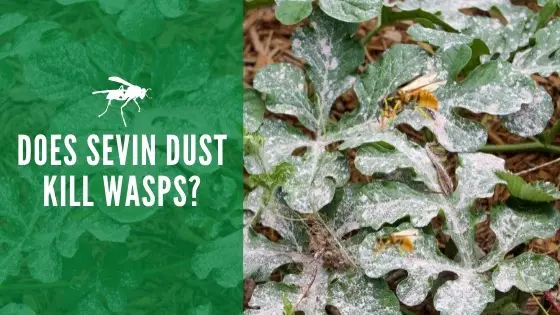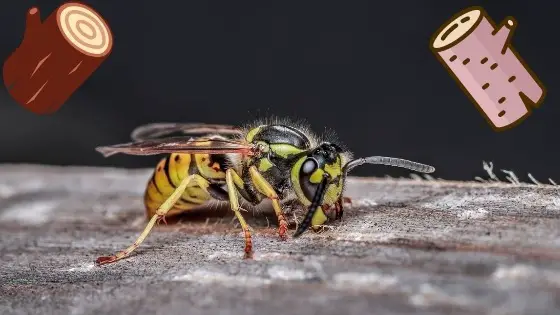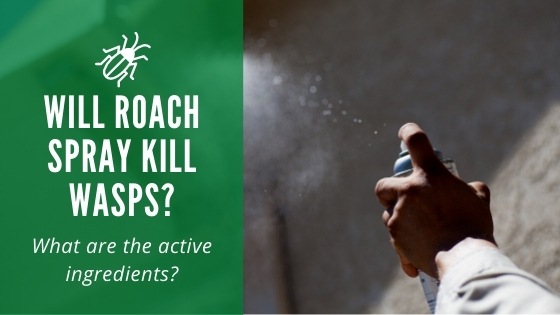Spraying Wasp Nest With a Hose
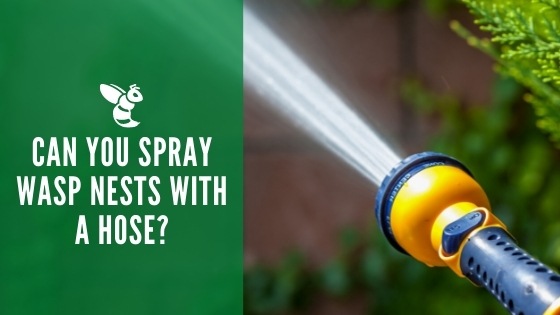
Unlike honeybees that are beneficial to our lawns and gardens, wasps present a true challenge when these stinging creatures take up residence near your home. Bees can only sting someone once, but wasps and hornets can sting multiple times and are usually more aggressive than the typical honeybee.
Many individuals wonder if it is possible or safe to kill wasps with a hose.
Can You Remove Wasp Nests with a Hose?
The answer to this question is complex. While wasps can be drowned with water, these flying insects know how to attack in a group formation that puts humans on the defensive. Wasps are already aggressive, and angering them with water will ignite that instinctive fight response.
The trick is to have a longer range hose and nozzle to stay far back from the nest that you are going to be spraying. You should have a powerful nozzle that can be adjusted to get a powerful spray of unrelenting water and be able to knock down and keep down aggressive wasps.
Review these preparation tips should you decide to attempt spraying a wasp hive/nest with a water hose that includes:
- Stand back at least 20 feet or more
- Use a long-reaching & powerful spray hose & nozzle
- Wear protective clothing & gear
- Wait until after dusk or early in the morning before dawn
- Wasps tend to get lethargic in cooler weather
- Consider using natural wasp repellents and/or lethal natural wasp solutions
- Call a pest exterminator if the problem is too big or if you are not successful
Remember, wait until dusk or get up before dawn to catch most of the wasps inside their nest. There will usually be some stragglers that getaway or have not returned to their nest. Keep in mind that simply spraying a wasp nest with water will not get rid of wasps for good. Wasps have no problem building a new nest, so you must implement a more effective and proven strategy.
How to Safely Get Rid of Wasps
There are some other terrific methods of safely getting rid of wasps using natural solutions and repellent substances. This is often a preferred method for small children or pets in the home that could be injured if toxic chemicals are sprayed in their vicinity. These toxic sprays may also harm nearby “good” or beneficial insects and wildlife.
Try These Non-Lethal Methods to Get Rid of Wasps
Use an Ordinary Brown Paper Lunch Bag
Open the paper bag, allow air to get inside, and seal with tape or tie off the end. Attach a string to the bag and hang it near where you notice wasps. Hornets are known to attack other flying insects, including wasps.
Since a hornet’s nest can resemble a brown paper bag outside, other flying pests tend to stay clear of this area. While we have not found any studies to prove the effectiveness of a fake wasp nest, many people swear by this method.
Spray Wasp Nest with Essential Oil Repellent Solutions
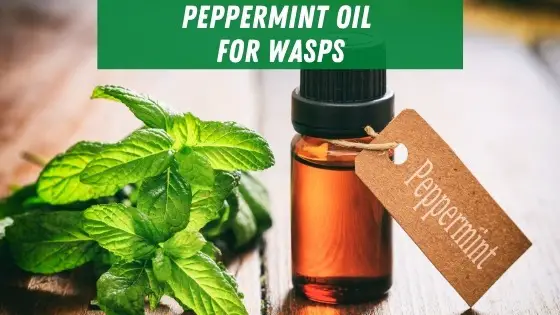
Wasps, and many other insects, truly dislike the smell of peppermint oil. A few drops per 3 cups of water can make an excellent gentle solution that should repel any wasps flying around the area.
After Destroying the Wasp Nest – Seal Cracks & Use Wasp Repellents
Once the nest is gone, seal up any nearby holes, cracks, and crevices to prevent these wasps from building a nest there again.
Consider Using These Natural but Lethal Methods to Kill Wasps
Make Your Own Wasp Trap
You can make an excellent wasp trap using a 2 Liter soda bottle with the top neck portion cut away. Turn that top piece upside down into the bottom half of the bottle. Smear a bit of jam near the bottom of that top hole area, now facing down into a solution of lemon extract, white vinegar, a few drops of dish soap, and water. The idea is to get the wasp down into the bottle to fall into the solution and cannot fly out.
Use Potent Lemon Extract to Kill Wasps
A solution of 3 tbsp. lemon extract in 1 cup water will render the wasp dead if it gets enough of the solution. Like any insect, these wasps instinctively protect themselves, but prolonged spraying of this solution or total immersion should do the trick.
Smother Wasps Inside Nest by Covering Nest with Sealed Plastic Bag
If the wasp nest is smaller and in an easy-to-access spot, you can try pulling up a plastic bag from the bottom up and then sealing off the top. This should be done after dusk or before dawn to have most of the wasps inside the nest. Always wear protective clothing and gear or even an actual bee suit.
Does Soap and Water Kill Wasps?
Yes, the right solution of common dish soap, like Palmolive, Dawn, etc., and water can work to kill wasps. Adding lemon extract or peppermint essential oil can also make the solution more potent. The peppermint and lemon extract will be lethal to wasps but shouldn’t hurt your pets or the surrounding environment. This soapy water solution can include white vinegar as well.
Does Water Get Rid of Underground Wasp Nests?
Some wasp species, like yellowjackets, make underground nests that are difficult to see. These wasps may use other holes that another animal has made, likely containing more than one entryway. Spray commercial wasp killer does not work well on these underground nests. You can try to use water, but this will take a lot of water over an extended period.
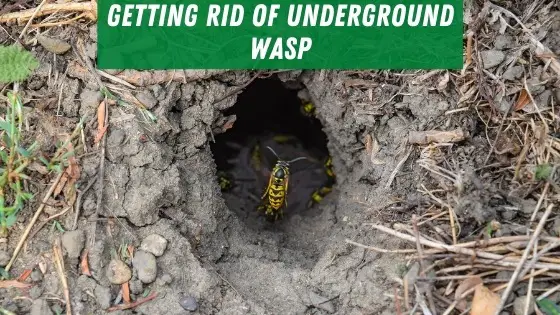
The best way to handle this type of nest is to use powdered formulas. Some commonly used substances for this purpose include boric acid, diatomaceous earth, and delta dust. Use as directed. The idea is to get wasps to walk over this powder, allowing some to stick onto their bodies. They will then bring this powder deeper into the nest, killing those wasps inside.
Conclusion
Wasps are not harmful if left alone, especially solitary wasps like the mud dauber. If they make nests too close to the home, they can become aggressive when people are near their nests. Great care should be taken when attempting to rid your property of one or more wasp nests.
Anyone who is allergic to wasps or bees should not attempt any of these processes. You should contact a local pest control professional as soon as possible if you are dealing with a difficult wasp problem.
Sources:
https://mbbch.com/symptoms/wasp-sting-reactions-remedies/
https://wasps.ucr.edu/wasp-identification

